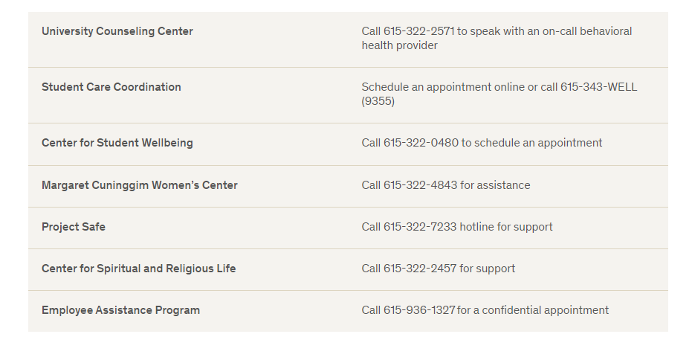Formed in early June by the Office of the Provost in coordination with the chancellor’s office, Vanderbilt’s university-wide task force is focusing on the impact of the Supreme Court’s June 24 decision to overturn federal abortion rights and a subsequent statewide abortion ban.
One of 13 states where trigger laws largely banning abortions have come into force following the court’s decision, Tennessee’s ban on abortions, that took effect Aug. 25, 2022, criminalizes all abortion but includes an affirmative legal defense for medical providers when the care provided was necessary to protect the life of the pregnant individual or to prevent substantial harm to their physical health.
Provost C. Cybele Raver charged the task force with identifying, and finding solutions for, impacts to clinical care, student and employee health and educational instruction, while also helping to drive academic discussion and programming to promote robust discourse and civic engagement around this important topic.
As part of this effort, the university is coordinating closely with leadership at the Divinity School, Law School, the School of Medicine, the School of Nursing and our partners at Vanderbilt University Medical Center.
Based on the findings of the task force, the university will provide updates regarding the decision’s impact on the Vanderbilt community, measures to address the impact and opportunities for discussion and debate.
Read Chancellor Diermeier's message to the campus community, sent on the day of the Supreme Court decision.
View the Aug. 10 town hall on reproductive health.
Read updates on the staff paid parental leave policy.
Read updates on the new reproductive health and parenting resource coordinator.
Task Force Members by Committee
Resources
Reproductive Health, Pregnancy and Parenting Resources
Following is a list of new and existing resources for the Vanderbilt University community.
| Program | How to Access | Available to | |
Paid Parental Leave (Updated) Leave for activities related to the care and well-being of their newborn or adopted child. Current program for faculty continues as-is, and the program for eligible staff is expanded to eight weeks.
| Details on the updated program for staff, including instructions for how to apply, can be found here. Details for faculty are in the Faculty Manual. | Staff Faculty | |
Short-Term Medical Leave Provides income replacement for those unable to work for an extended period due to an approved medical condition.
| Details for faculty are in the Faculty Manual | Faculty | |
Short-Term Disability Insurance Provides income replacement for those unable to work for an extended period due to an approved medical condition.
| Details available on the Human Resources website | Full-time Benefit Eligible Staff | |
Reproductive Health and Parenting Resource Coordinator - Office of Health and Wellness (New) First point of contact for pregnant individuals at the university who need assistance and support – engaging in unbiased conversations and helping coordinate care through campus offices and resources. | Details available here. | All students Faculty Staff Postdoctoral scholars | |
Employee Critical Support Fund Aids with unexpected expenses, including costs related to any medical procedure not available in Tennessee
| Details on how to apply, will be shared in the coming weeks. | Faculty Staff Postdoctoral scholars | |
Student Critical Support Fund Aids with unexpected expenses, including costs related to any medical procedure not available in Tennessee
| Details on how to apply, will be shared in the coming weeks. | All students | |
Student Health Center Provides sexual and reproductive health services, including contraceptive care
| Contact Vanderbilt’s Student Health Center for more information. | All students | |
Title IX office Provides accommodations and support for persons who are pregnant or experiencing any pregnancy-related condition | Submit accommodation requests here. | All students Faculty Staff Postdoctoral scholars | |
Additional Resources
| University Counseling Center | Call 615-322-2571 to speak with an on-call behavioral health provider |
| Student Care Coordination | Schedule an appointment online or call 615-343-WELL (9355) |
| Center for Student Wellbeing | Call 615-322-0480 to schedule an appointment |
| Margaret Cuninggim Women’s Center | Call 615-322-4843 for assistance |
| Project Safe | Call 615-322-7233 hotline for support |
| Center for Spiritual and Religious Life | Call 615-322-2457 for support |
| Employee Assistance Program | Call 615-936-1327 for a confidential appointment |
Frequently Asked Questions
Pregnancy and Parenting Resources
Legal
Task Force
Privacy
Advocacy And Free Expression
Mental Health

Suggestions and Feedback
Suggestions and/or feedback for the reproductive health task force.
"We remain steadfast in our commitment to support women’s health and the safety and well-being of our community and to create a supportive and inclusive environment for educational success.
As a leading research university, it is also our responsibility to confront head-on the most pressing challenges of our time and provide a forum for exploration, debate and scholarly research, all while providing wide-ranging resources and support to our campus community."
Daniel Diermeier
Chancellor, Vanderbilt University